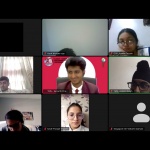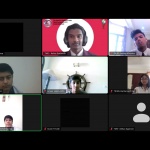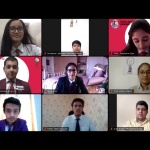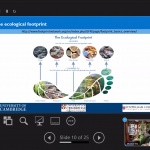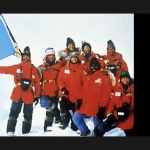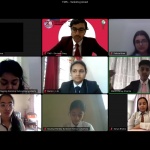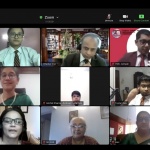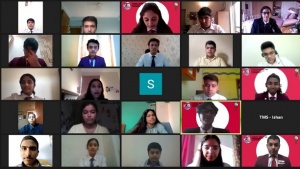
The Millennium School, Dubai
Virtual Round Square Conference
Theme : Accelerating the Transition to Sustainability
Under the mentorship of Mr. Manish Seksaria – Head of Department (Computer Science) and Round Square Representative – delegates (Radhika Swaroop, Pranjali Tripathi, Sanya Bhatia, Anmay Khemka and Aditya Tandon) participated in a virtual round square conference hosted by The Millennium School Dubai, on the central theme-Accelerating the Transition to Sustainability, held on 28th & 29th October,2020.
The event saw the participation of over 200 students from prestigious schools and more than 5 different countries.
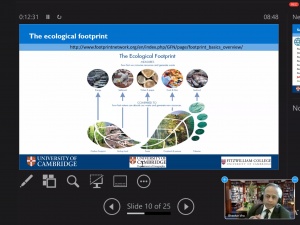 The conference began on an enriching note when the Principal, Mrs. Ambika Gulati, enlightened us with her thoughts on the theme and set the conference in motion. The students also had the opportunity to interact with various keynote speakers and the Chief Guest.
The conference began on an enriching note when the Principal, Mrs. Ambika Gulati, enlightened us with her thoughts on the theme and set the conference in motion. The students also had the opportunity to interact with various keynote speakers and the Chief Guest.
The first keynote speaker, Mrs. Fatima Mubarak, highlighted various topics related to the theme: Climate change, global warming, mitigation and reduction of these environmental evils, Zero Carbon Future and utilisation of energy efficient measures such as solar panels and rainwater harvesting.
The Guest of Honour, Mr. Michael Guzdar, CEO of The Millennium School, Dubai, spoke about diversity in opportunities and multiple means for education in the current times. He also reminisced the interactive, fun and physical sessions of Round Square.
The second keynote speaker, Mr. Bhaskar Vira, an Indian academic, professor of economic geography, and the current Head of Department of Geography, University of Cambridge, elaborated at large the challenges to sustainability (climate change,food security,depleting energy and resources), World Economic Forum’s Global Risk Report, unsustainable exploitation, Carbon footprint/ecological footprint, Earth Overshoot Day, 17 sustainable goals set by the UN and how different sections of the society can contribute in saving the environment.
After these enriching and mind-engaging words by all the speakers, the students had the opportunity to interact with each other and have fruitful discussions in their respective breakout rooms.
Following this, we had a display of presentations by different participating schools and this marked the end of Day 1.
The second day of this remarkable conference was as captivating as the first. The first keynote speaker, Mrs. Habiba Al Marashi, Chairperson of the Emirates Environmental Group, stressed on the importance of recycling and sustainable production. She also elaborated on the harmful effects of COVID-19 on the environment and the students had an interactive Question-Answer session following that.
To add some fun to the event, the participants also participated in an online treasure hunt designed by Samarth Chandna, the Head Boy of the school. The participants were regaled by this team project.
Next, the second keynote speaker, Mr. Robert Swan, an acclaimed author and the first person to walk to both Poles, guided the students by his inspiring life story and how his perseverance and determination led him to achieve his dream of walking to the North Pole and South Pole. He now runs a foundation called ‘2041’ which engages businesses and communities on climate science, personal leadership, and the promotion of sustainable practices. His words instilled the students with enthusiasm and determination.
The third barraza session saw the students engaging in illuminating discussions related to the keynote speakers, sustainable sources of energy and how they can play their part in saving the environment.
The closing ceremony concluded with some cultural presentations by the participating schools, an overview of the conference, words of advice from the Principal and a Vote of Thanks by the students.
The conference was very well organised by the students of The Millennium School Dubai, who ensured a smooth and insightful session for all. They left no stone unturned in making this experience an enriching one for all the participants. The conference transcended the bounds of time zones and geographical constraints.





